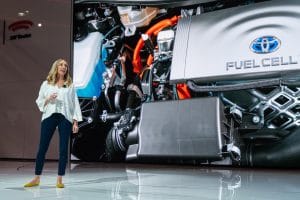
The air over Los Angeles has been unusually clear over the past two months, a silver lining amidst the pandemic shutdown. But there’s hope that this becomes the norm, rather than the exception in the years ahead.
Toyota has been playing a role in cleaning things up with the broad line-up of hybrids it now offers, but the automaker also is betting on another alternative powertrain technology, the fuel-cell system used not only in its Mirai model but also in a handful of hydrogen-powered heavy truck prototypes now being tested at the Ports of Los Angeles and Long Beach.
Though fuel-cell vehicles may not garner the headlines reserved for battery-electric vehicles, Toyota is convinced the technology will find a large audience in the years ahead, both in the retail and commercial transportation sectors, and it’s getting set for a major ramp-up of production. TheDetroitBureau.com spoke to Jackie Birdsall, a senior engineer and one of the leaders of the Japanese automaker’s push into hydrogen power to get a sense of why it is betting on the technology and what’s in store.
TheDetroitBureau: You’ve been working on hydrogen fuel-cell technology since2003. How did that come about?
Jackie Birdsall: I would call it luck. I got an internship when I was at Kettering University in Michigan and was offered a co-op position at (what was then) DaimlerChrysler when I didn’t even know fuel cells existed. It was a phenomenal learning opportunity and once I saw the potential that was clearly where my career was guided.
(Toyota, PACAR teaming up to field a fleet of fuel-cell trucks.)
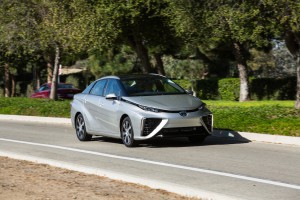
TDB: There are a lot of misconceptions about fuel cells. Many people don’t know they effectively replace the batteries in an all-electric vehicle. Might we start with a brief explanation of how they work?
Birdsall: When you’re driving, hydrogen from the fuel tank is combining oxygen from the air (in a device called a fuel-cell stack) The byproduct is electricity (going to) the electric motors driving the vehicle. The only thing coming out of the tailpipe is water.
TDB: So, the fuel-cell stack is essentially a replacement for batteries in an electric vehicle?
Birdsall: We’ve found that when people hear “zero-emissions vehicles,” they only think of batteries, but that’s an opportunity for us to educate people about hydrogen. In many cases, it is more suitable to replace a conventional vehicle with a fuel-cell vehicle, at least if you’re near a hydrogen fueling station because you can refill in five minutes and get over 300 miles range on our current generation Mirai, and over 400 miles with the next-generation model.
TDB: I’ve been following fuel-cell technology myself for decades and it seems like there’ve been a lot of improvements lately.
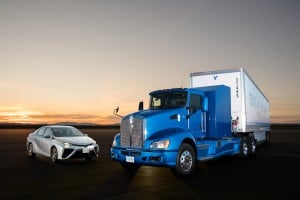
Birdsall: That’s absolutely right. When I first started working on this technology we would fit all the components in the back of a van and get 50 miles before running out of fuel. The current Mirai carries four people and gets 312 miles on a fill with all the components fitting into a conventional sedan structure. The downsizing has been phenomenal.
TDB: You’ve also been able to drop costs by, among other things, reducing the use of platinum and other expensive metals, I believe.
Birdsall: Yeah, we’re targeting to get to the same level of platinum as we use in a (gas car’s) catalytic converter. And we’ve able to develop something called a boost convertor to help reduce costs even more. (ED: this uses a hybrid-sized battery that provides an additional burst of energy under hard acceleration and other high demand situations so the fuel-cell stack can be downsized, also reducing costs.)
TDB: So, how much will costs come down?
Birdsall: From the prototype that preceded it to Mirai we were able to reduce costs 95%, a really incredible reduction. We don’t expect the same type of reduction for the next generation, but it will still be substantial.
TDB: To the point the cost of producing the next Mirai will be comparable to a similar gas vehicle?
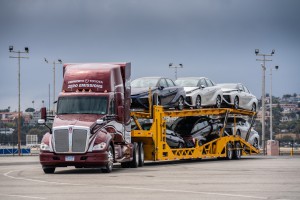
Birdsall: Not so much in the near-term, quote-unquote, because of production volumes. But if we didn’t see parity coming we’re wouldn’t have invested in the technology in the first place. It’s a matter of production volume.
TDB: And Toyota has some big plans to ramp up production, doesn’t it?
Birdsall: We have prepared to ramp up our production capability tenfold in Japan, meaning we’ll be building more fuel-cells than anyone else in the world.
TDB: What sort of numbers are you talking about? So far, we’ve sold about 6,000 Mirais in the state of California (alone since its launch in late 2015). We’re ramping up to 30,000 vehicles per year (for worldwide sales), and if we see the demand we have the capacity to ramp up even more. But we’re being paced by the infrastructure and we hope this will get some new (hydrogen) station providers.
(BMW makes big push into hydrogen technology.)
TDB: Are the fuel-cells Toyota is planning solely for automobiles and trucks?
Birdsall: Fuel cells are scalable so you can have them small enough for a cellphone tower or large enough for a building. In the U.S., fuel-cell forklifts have already become a commercial product and are replacing battery-electric forklifts in warehouses across the country. They’re really attractive in warehouses operating 24 hours a day because they can refill in a matter of minutes.
TDB: But where do they get fuel? Isn’t that the problem?
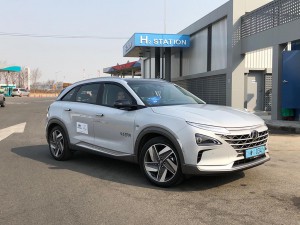
Birdsall: You put in a hydrogen fueling station. Something like 100 million tons of hydrogen are produced in the U.S. each year. It’s mass produced and there are pipelines everywhere and it can be trucked. The sticking point (especially for vehicles like Mirai) is finding the dispensers to put it into your vehicle. That’s going to take a clear vision that everyone can grab onto. We have the California Fuel Cell Initiative and it says we only need 1,000 stations to serve a million customers. We need other states to replicate that same type of vision.
TDB: There are some hydrogen advocates who believe the best approach is to focus on heavy trucks, like the ones Toyota is testing at the Los Angeles ports. Others want to start with hydrogen vehicles like Mirai. What do you think?
Birdsall: They are complimentary. The passenger car market brings us a large amount of production volume so we’re able to reduce the cost of the technology. And the heavy trucks help us bring down the cost of fuel and help spread out the network of refueling stations.
(Daimler and Volvo announce joint venture on hydrogen trucks.)
TDB: Toyota isn’t the only automaker getting serious about hydrogen. We’re seeing traditional competitors like Honda and Hyundai, as well as start-ups like (heavy truck maker) Nicola Motors. Is that a good or bad thing from Toyota’s perspective?
Birdsall: We’re very excited to have other competitors enter the space. That drums up a little more interest from the consumer. As you know, a little friendly competition is always good for an industry…a real win for the hydrogen infrastructure.
(Nikola Badger will be a long-range hydrogen-electric pickup.)








Makes a lot more sense than battery electrics, if they can really get the cost down.